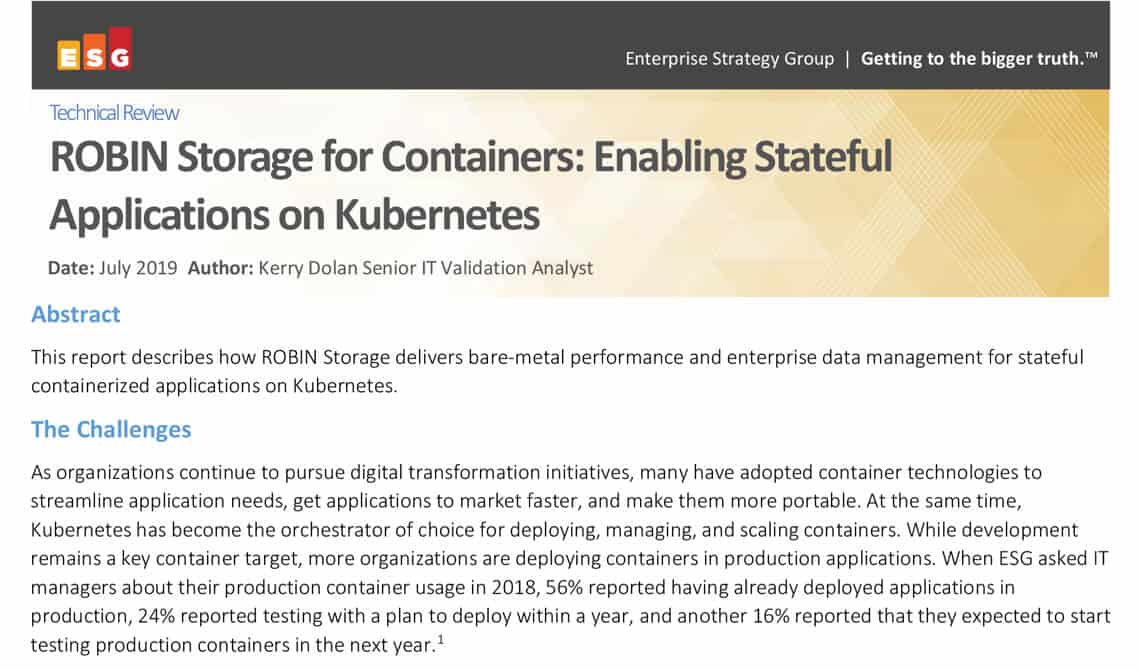Robin Storage for Containers: Enabling Stateful Applications on Kubernetes


This report describes how ROBIN Storage delivers bare-metal performance and enterprise data management for stateful containerized applications on Kubernetes.
– ESG validated how Robin Storage simplifies application management, protection, and portability
– ESG validated that Robin Storage can bring a new set of applications into the containerized world
– Robin Storage brings advanced data management capabilities to Kubernetes
Learn more – Robin Storage for GKE and OpenShift
Abstract
This report describes how Robin Storage delivers bare-metal performance and enterprise data management for stateful containerized applications on Kubernetes.
The Challenges
As organizations continue to pursue digital transformation initiatives, many have adopted container technologies to streamline application needs, get applications to market faster, and make them more portable. At the same time, Kubernetes has become the orchestrator of choice for deploying, managing, and scaling containers. While development remains a key container target, more organizations are deploying containers in production applications. When ESG asked IT managers about their production container usage in 2018, 56% reported having already deployed applications in production, 24% reported testing with a plan to deploy within a year, and another 16% reported that they expected to start testing production containers in the next year.1
Why the increased interest? Container technologies abstract applications from hardware by virtualizing the operating system, which is a lightweight design that makes them efficient, reliable, scalable, and portable. Containers enable development autonomy and agility, as developers can do more on their own without IT provisioning or management. The infrastructure and staffing efficiency of containers result in lower costs and streamlined processes.
Stateless containers have no need to keep data persistent once the processes they are executing have finished. A key challenge for running enterprise-class, container-based production applications is that they are most often stateful: that is, the applications maintain data from each compute session, even when the container terminates. As a result, running applications such as databases, artificial intelligence/machine learning (AI/ML), or custom-built applications on Kubernetes requires external storage that outlasts the container. When running mission-critical processes, these applications need swift storage provisioning, predictable performance, full data protection and security, easy data sharing, and the flexibility to leverage hybrid/multi-cloud deployments.
There are numerous external storage solutions that support containers through Container Storage Interface (CSI)-compliant APIs to manage interactions between container orchestrators such as Kubernetes and storage arrays. However, these solutions do not provide the performance and data management capabilities that enterprise production applications demand. They provide storage at the volume level but cannot deliver application-level data services.
The Solution: Robin Storage
Robin Storage is a CSI-compliant, container-native, software-defined block storage solution that offers enterprise-class performance and data management capabilities for Kubernetes-orchestrated containers. It provides resilient storage (supporting HDD, SSD, and NVMe) with bare-metal performance, and has built-in data rebalancing, disk and I/O error-detection, volume rebuilds, and hotspot detection.
[button open_new_tab=”true” color=”accent-color” hover_text_color_override=”#fff” size=”jumbo” url=”/wp-content/uploads/2019/07/esg-technical-review-robin-storage-technical-review.pdf” text=”Read ESG Technical Review for Robin Storage” color_override=””]
